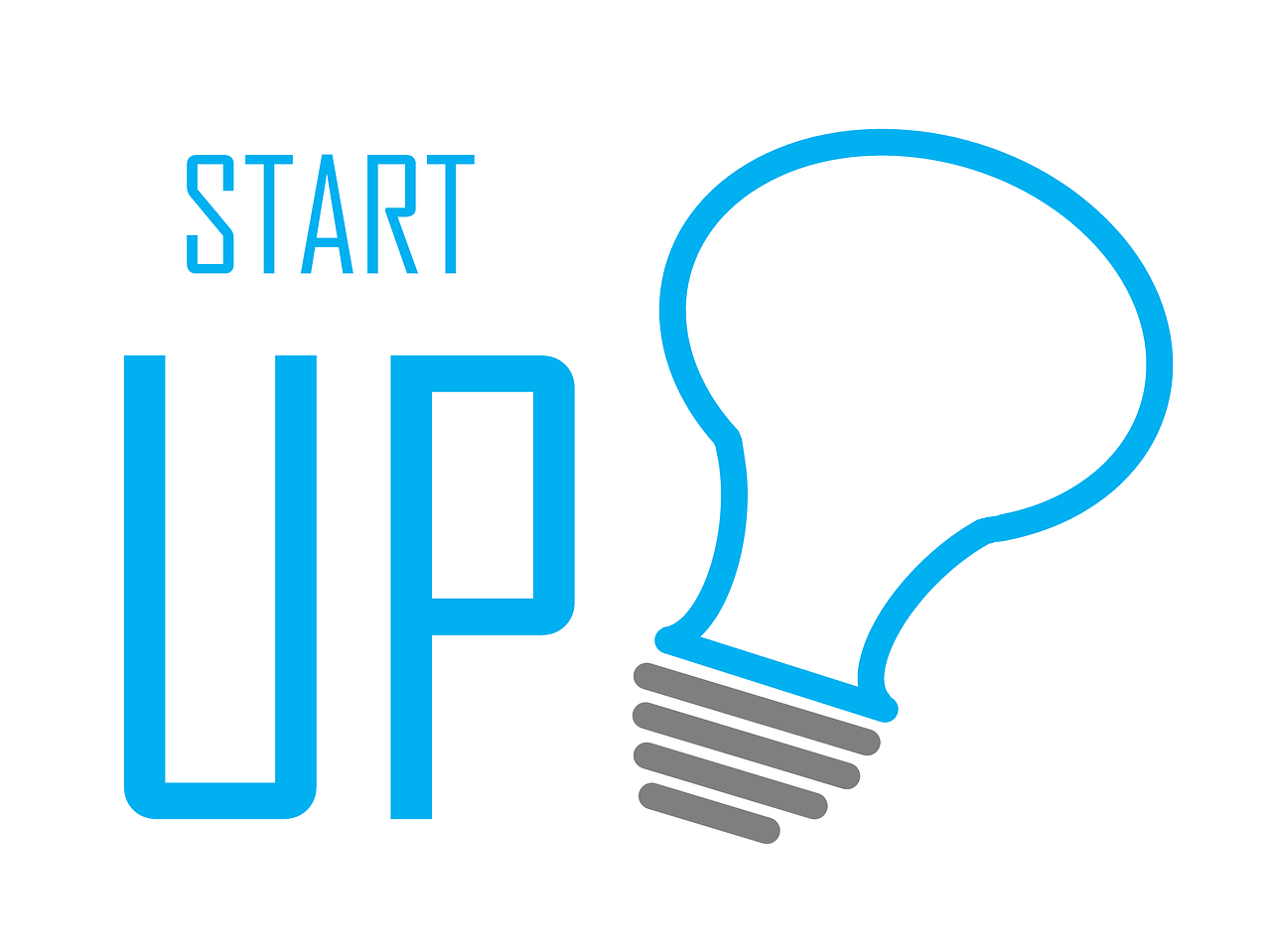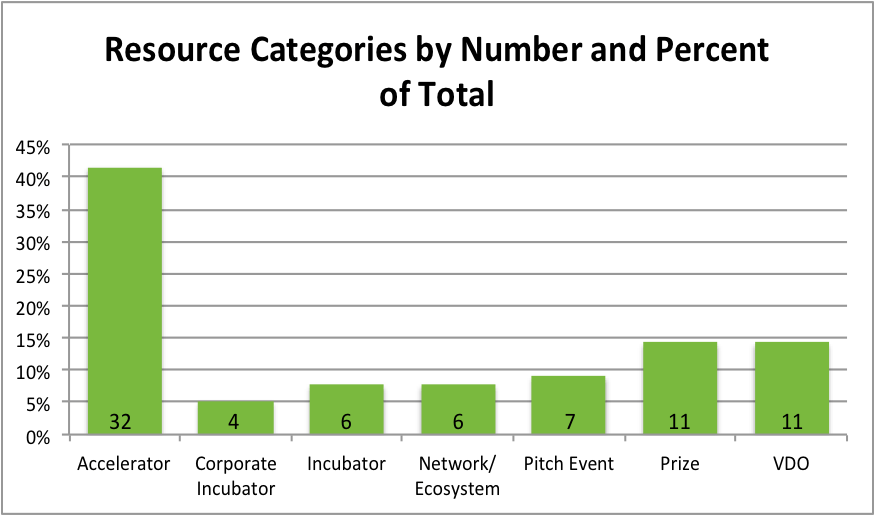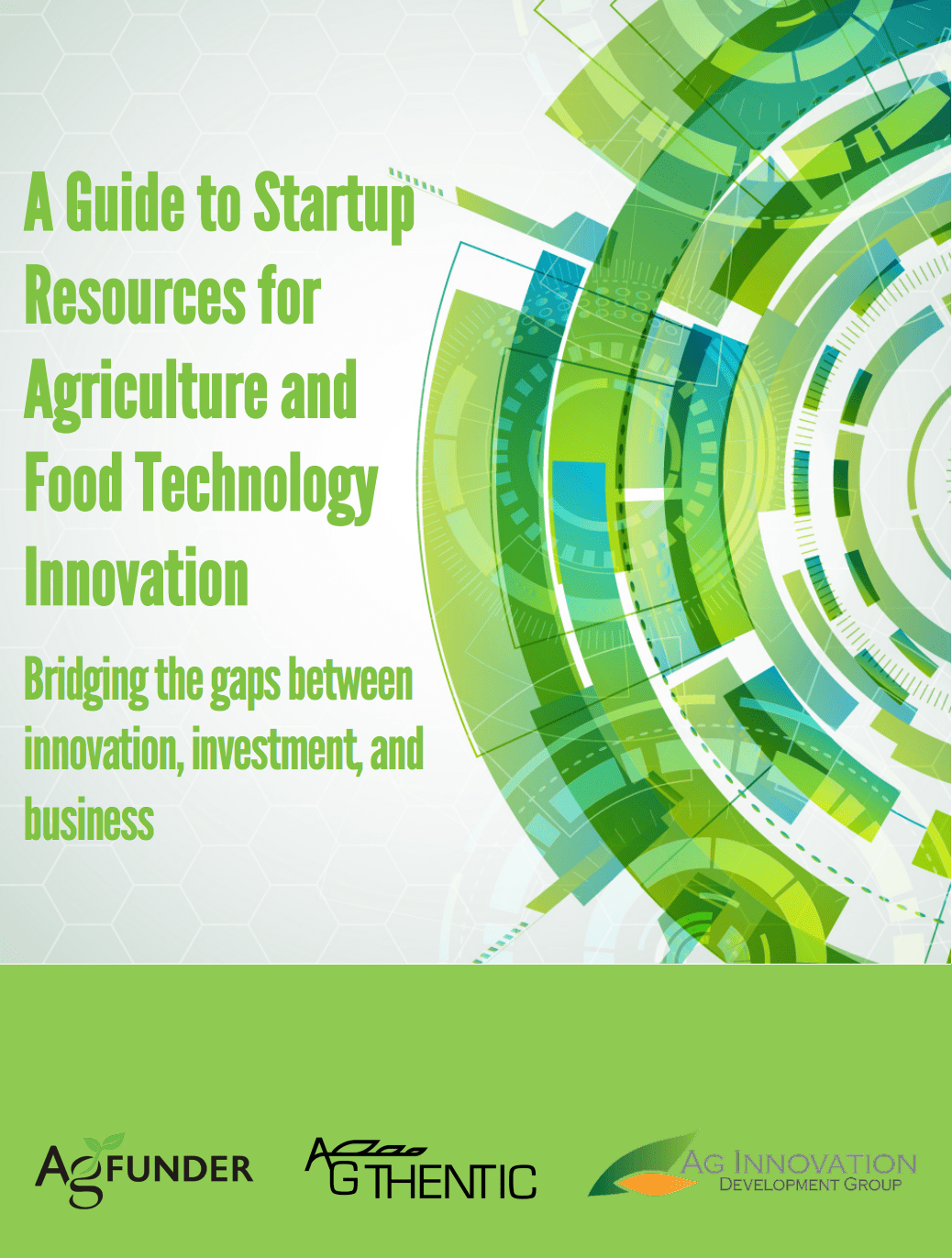Editor’s Note: Today, AgFunder, AgThentic, and Ag Innovation Development (AgIDG) Group release a new report entitled: A Guide to Startup Resources in Agriculture and Food Technology. The report details the 77 startup resources available to food and agriculture technology startups today.
The USDA has recognized this report and is looking to work with AgFunder, AgThentic, AgIDG and others to convene many of the startup support resources mentioned in the report with the hope of leveraging additional capital sources, commercializing research, and further addressing gaps in agriculture innovation.
Startup companies in any industry will face many challenges on their journey from an idea to a sustainable business. Many entrepreneurs will look for resources to help them on that journey, such as accelerator programs and incubators. If you’re in the technology or venture capital space, it’s likely you will have heard of accelerators like 500 Startups and Y Combinator.
If you’re in the food and agriculture technology space, you are also very likely to be aware of the growing number of startup resources on offer as the industry undergoes a transformation that some are referring to as Agriculture 2.0 or the Third Green Revolution.
Accelerators are just one part of the resources landscape, and a new report released today identifies and defines the 77 startup resources in agriculture and food globally.
The aim of these resources is to fill critical gaps in the journey entrepreneurs take from idea to business. Some of these gaps include funding, market access and partnerships. But these startup resources in agriculture and food come in various formats, which has caused confusion in the industry about what exactly they offer and the terminology used to describe them. Does an accelerator need to offer a set curriculum? Is a venture fund with a hands-on style really an accelerator?
While these resources are all focused on creating and supporting successful food and agriculture technology companies, each of them takes a different approach. Some offer funding, others focus on certain technologies or geographies, while others focus on helping companies get access to their customer base. These different approaches mean that some startups will suit a particular type of resource more than another.
A Guide to Startup Resources in Agriculture and Food Technology Innovation defines seven different types of resource, classifying each of the 77 individual resources into these categories.
Below is a brief insight into the different types of startup resources in agriculture and food.
Accelerator: a set duration program where a cohort of selected early-stage companies gets access to a business development curriculum and mentor network. Accelerators often result in funding for participating startups on a set or negotiated basis. This is probably the best-known type of resource and has the largest number of individual resources, according to the report.
Corporate Incubator: this provides startups with access to capital and the wider resources of a corporation. Participation in a corporate incubator can often lead to the corporate in question acquiring the startup.
Incubator: a physical workspace or lab that provides support such as technological expertise and mentorship; no fixed duration; rolling acceptance.
Network/Ecosystem: a platform, often virtual, that provides access to resources such as mentors, investors and research.
Pitch Competition: a one-time event, usually focused on connecting startups to investors.
Prize: a competition, usually culminating in a pitch event, with monetary reward.
Venture Development Organization: often regionally focused, VDOs have ties to corporations, universities and/or government and perform commercialization functions either as a service or by licensing IP.
The accelerator category is the biggest at the moment, and so far this year 13 new accelerators have launched in the sector.
Here is a complete list of all 32 accelerators programs that can be found in the guide.
33 Entrepreneurs – based in France, this program focuses on wine & spirits, gastronomy and travel.
Accelerating Appalachia – focusing on “nature-based businesses”, this program hosts workshops in North Carolina and Kentucky.
AccelFoods accelerates and invests in early-stage packaged food and beverage brands and is based in New York.
AgLaunch was developed to support agtech startups that want to apply their solutions to Southern agriculture including row crops & livestock.
AgroInnovation Lab – backed by Austrian agricultural cooperatives RWA and Raiffeisen Lagerhaus, this accelerator involves startups from across Central and Eastern Europe.
Amius Startup Program is focused on European agtech startups and is backed by UK commodities firm Amius.
Centre for Innovation Incubation and Entrepreneurship is India’s first food and agriculture accelerator.
Climate Ventures 2.0 backed by Good Company Ventures, this accelerator launched out of the White House Climate Data Initiative.
Dig Eat All is based in Spain and attracts startups innovating in the food, agriculture, and food-related health industries.
Food Future – focusing on food, agriculture, and social entrepreneurship, this accelerator appeals to more mature startups and is based in New York.
Food Hatch has offices in New York and Florida and invests in food startups across the US.
Food System 6 is a cross-sector accelerator focused on supporting
agtech startups with a focus on sustainability
Food-X – one of SOS Ventures’ accelerators, Food-X is based in New York and focuses on food startups.
Good Food Business Accel appeals to local, sustainable, fair and humane food startups.
H-FARM Food Accelerator – in partnership with Cisco, this agtech-focused European program is based in Italy.
Indie Bio – SOS Ventures’ leading accelerator, Indie Bio is focused on life sciences broadly and has graduated several food and ag-focused startups.
Iowa Ag Startup Engine is a new initiative at Iowa State University Research Park for agricultural entrepreneurs in the region.
NXTP Labs AgroTech Program is the first agtech accelerator in South America, targeting Argentinian and Uruguayan startups.
Prometheus – a Spanish program, it focuses across the food ecosystem.
RevTech – based in Dallas, this program focuses on the retail, restaurant & hospitality industries.
Simplot Ignite is a corporate-backed food-tech accelerator based in Australia.
SKU – a consumer products accelerator based in Austin, Texas, this program has a broad remit across CPG startups.
Skywalker Accelerator is focused on cannabis-related startups and is based in Denver.
Sprout Agritech – New Zealand’s first and only agtech accelerator, which recently completed its first cohort.
Sprout-X will be Australia’s first accelerator purely focused on agriculture and is an initiative of the National Farmers Federation.
Square Roots – an urban farming program, Kimbal Musk is set to launch the program in New York later this year.
Startup Bootcamp FoodTech is based in Rome, Italy and has a broad remit across agriculture, cooking, restaurants, retail, and more.
Startup Next by Land O’Lakes is a pre-accelerator within the TechStars ecosystem and based in Minnesota.
TERRA – based in San Francisco, this resource is a collaboration between coworking space RocketSpace and Rabobank.
The Yield Lab – the first accelerator to focus purely on agriculture, it is based in St Louis and recently launched a program in Ireland.
Thrive Accelerator – based in Salinas, California, this program has partnered with Verizon, Western Growers, Land O’ Lakes, Taylor Farms and Wells Fargo.
Village Capital – the first accelerator to launch a dedicated agriculture program, Village Capital’s ag practice is based in Louisville, Kentucky.
For more in-depth analysis of the gaps in funding, definitions of the different types of resources, an exhaustive list of all the available startup resources in agriculture and food, download the report here.







